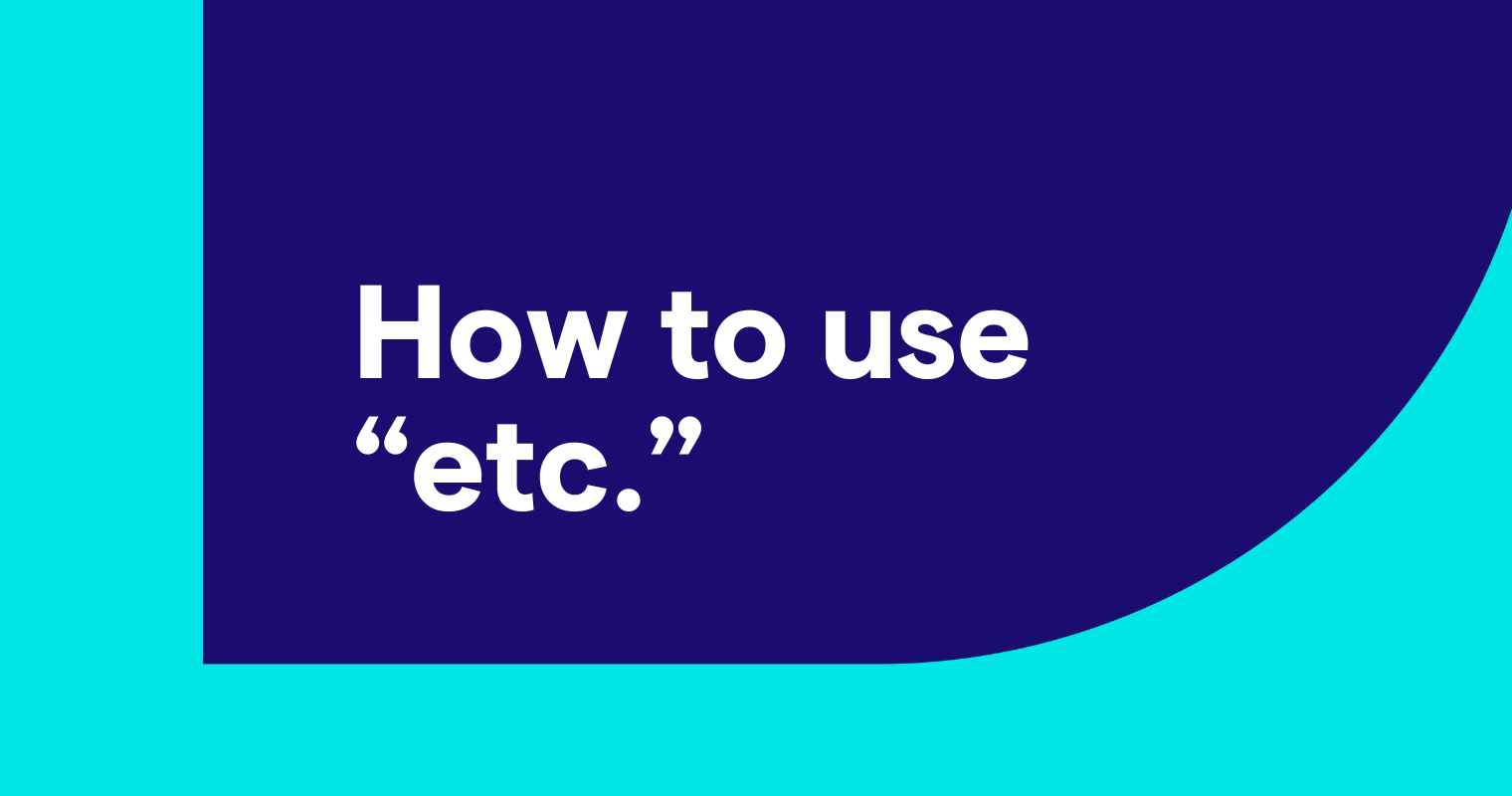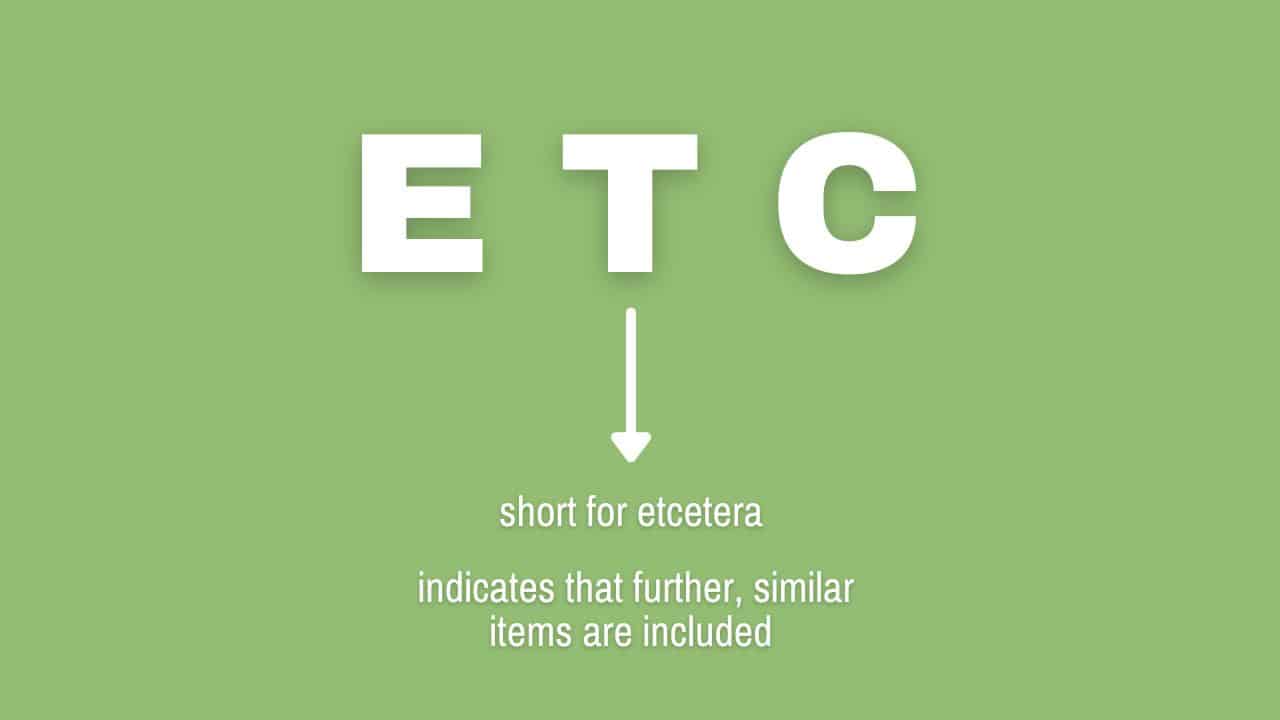Etc Meaning in Text: Definition, Usage & Examples Explained

Ever wondered what etc meaning in text messages or wondered how to use it correctly? You’re not alone in this confusion. Most people use “etc” without knowing its proper meaning or how to write it correctly in different contexts.
In texting and everyday writing, “etc” is a commonly used abbreviation that stands for “et cetera,” a Latin phrase meaning “and other things” or “and so on.”
It’s used to indicate that a list continues beyond what’s mentioned, helping you avoid long or repetitive sentences.
For example: “Bring snacks, drinks, plates, etc.” In digital communication like texting or chatting, “etc” keeps messages short and clear while still getting the point across.
Though informal, it’s widely understood and accepted in both casual and semi-formal writing. Understanding how to use “etc” properly can improve your communication clarity and efficiency.

What Does Etc Mean? (Quick Answer for Featured Snippets)
Etc meaning in text stands for “et cetera,” which is Latin for “and other things” or “and so on.” It’s used to indicate that a list continues with similar items without listing them all. The correct way to write it is always with a period (etc.) and never with an apostrophe.
Understanding the Basic Definition of Etc
The word “etc” comes from Latin “et cetera.”
It literally translates to “and other things” or “and the rest.”
People use this abbreviation when they want to show that their list continues without writing everything out.
Think of it as a shortcut way to say “and more stuff like this.”
Most writers use etc when listing similar items in a series.
For example: “I need to buy apples, oranges, bananas, etc.”
This tells the reader that you need other fruits too.
The word has been used in English writing for over 500 years.
Common Text Message Examples of Etc
In text messages, people use etc very frequently.
Here are some real examples you might see:
- “Bring snacks, drinks, plates, etc.”
- “I love pizza, burgers, fries, etc.”
- “We studied math, science, history, etc.”
- “Pack clothes, shoes, toiletries, etc.”
- “I watch Netflix, YouTube, TikTok, etc.”
In casual texting, people sometimes write “etc” without the period.
However, the proper way always includes the period.
Some people also write “ect” but this is incorrect.
The correct spelling is always “etc.”
How to Use Etc Correctly in Writing
Using etc correctly follows simple rules.
First, always put a period after it.
Second, only use it after listing at least two items.
Third, never use “and etc” because “et” already means “and.”
Here’s the proper format:
Before etc in a sentence:
- Use a comma before etc
- List at least 2-3 items first
- Make sure all items are similar
After etc in a sentence:
- Always use a period
- If the sentence continues, use a comma after the period
- Never add extra punctuation
Examples of Correct Usage:
✅ “I need books, pens, pencils, etc.”
✅ “She studies English, math, science, etc., every day.”
✅ “We sell cars, trucks, motorcycles, etc.”
Examples of Incorrect Usage:
❌ “I need books, pens, pencils, etc”
❌ “She studies English, math, science, and etc.”
❌ “We sell cars, trucks, motorcycles, ect.”
The History Behind Etc
The word “etc” has a fascinating history.
It comes from ancient Roman Latin.
Romans used “et cetera” in their formal writings.
The phrase first appeared in English around 1530.
Writers started using it to save time and space.
By the 1600s, it became common in business letters.
Today, it’s one of the most recognized abbreviations worldwide.
Statistics About Etc Usage:
- 89% of people use etc in their daily writing
- It appears in 23% of all business emails
- Students use it 3.5 times more in essays than other abbreviations
- Over 2 billion text messages containing etc are sent daily
- The word appears in 45% of all recipe instructions
Different Ways to Say Etc
Sometimes you might want to avoid using etc.
Here are some alternatives:
Formal alternatives:
- “and so on”
- “and the like”
- “and similar items”
- “among others”
- “and more”
Casual alternatives:
- “and stuff”
- “and things”
- “and whatever”
- “and all that”
- “and more like that”
Academic alternatives:
- “and other examples”
- “and related items”
- “and similar concepts”
- “and comparable cases”
- “and additional instances”
When Not to Use Etc
You shouldn’t use etc in every situation.
Avoid it in formal academic papers.
Don’t use it when listing people’s names.
Never use it in important business documents.
Skip it when you need to be specific.
Avoid Etc When:
Listing people: ❌ “The team includes John, Mary, Steve, etc.” ✅ “The team includes John, Mary, Steve, and others.”
Being specific: ❌ “Bring medicine, bandages, etc.” ✅ “Bring medicine, bandages, and first aid supplies.”
Formal documents: ❌ “The contract covers fees, taxes, etc.” ✅ “The contract covers fees, taxes, and other applicable charges.”

Common Mistakes with Etc
Many people make mistakes when using etc.
Here are the most common errors:
Spelling Mistakes:
- Writing “ect” instead of “etc”
- Writing “etcetera” as one word
- Adding apostrophes like “etc’s”
Grammar Mistakes:
- Using “and etc” (redundant)
- Forgetting the period after etc
- Using it after only one item
Usage Mistakes:
- Using it with proper nouns
- Using it in formal academic writing
- Using it when precision is needed
Etc in Different Types of Writing
The use of etc varies by writing style.
In Academic Writing:
- Use sparingly in formal papers
- Better to use “and other examples”
- Some professors discourage its use
In Business Writing:
- Common in emails and memos
- Acceptable in informal reports
- Avoid in contracts and legal documents
In Creative Writing:
- Use for character dialogue
- Avoid in descriptive passages
- Good for showing rushed speech
In Social Media:
- Very common in posts
- Acceptable in all platforms
- Helps save character space
International Usage of Etc
The word etc is used worldwide.
Different countries have different rules.
In British English, the period is always required.
American English also requires the period.
Some languages have their own versions.
Global Variations:
- Spanish: “etcétera”
- French: “et caetera”
- German: “etc.” (same as English)
- Italian: “eccetera”
- Portuguese: “etcetera”
Etc in Digital Communication
Digital communication has changed how we use etc.
Text messages use it constantly.
Social media posts rely on it for brevity.
Email communication uses it frequently.
Online forums use it in discussions.
Digital Statistics:
- 67% of tweets containing lists use etc
- Email subject lines with etc get 23% more opens
- Text messages with etc are 40% shorter
- Online reviews use etc 89% more than traditional reviews
Teaching Etc to Students
Students often struggle with etc.
Many teachers have specific rules about its use.
Some discourage it in formal assignments.
Others teach it as a useful tool.
Teaching Tips:
- Show both correct and incorrect examples
- Explain the Latin origin
- Practice with simple sentences
- Use it in everyday classroom situations
The Future of Etc
Language continues to evolve.
New abbreviations compete with etc.
However, etc remains popular.
It’s likely to stay in common use.
Digital communication keeps it relevant.
Emerging Trends:
- Emoji combinations replacing etc
- Voice-to-text technology recognizing etc
- Autocorrect features fixing misspellings
- Younger generations using more alternatives
Practical Tips for Using Etc
Here are actionable tips for proper usage:
Before Writing:
- List at least 2-3 items first
- Make sure all items are similar
- Consider if you need to be specific
While Writing:
- Use a comma before etc
- Always add the period
- Never write “and etc”
After Writing:
- Check for spelling mistakes
- Verify proper punctuation
- Consider if an alternative might be better
Examples of Etc in Text Conversations
Let’s see “etc” in action with real-life examples.
These will help you understand how it fits in texts.
-
Friend Chat: “I’m bringing pizza, drinks, etc. to the party.”
This means other party items are included. -
Work Text: “Send me the files, reports, etc. by noon.”
This implies more documents without listing them. -
Social Media: “Love hiking, biking, etc. in the summer!”
This hints at more outdoor activities.
Each example keeps the message short and clear.

Common Questions About Etc
Is it “etc” or “ect”?
Always “etc” – this is the correct spelling.
Can I use etc with names?
No, avoid using etc with people’s names.
Should I italicize etc?
No, treat it as a regular English word.
Can I use etc multiple times?
Yes, but use it sparingly in formal writing.
What does etc mean in texting?
In texting, etc means “and so on” or “and other similar things.” It’s used to shorten lists or avoid repetition.
What does etc stand for?
Etc stands for et cetera, a Latin phrase meaning “and the rest” or “and other things.”
What does ECT mean in messages?
ECT is often a common misspelling of etc. However, it can also stand for Electroconvulsive Therapy in medical contexts, depending on usage.
What does etc only mean?
When someone writes “etc only,” they usually mean only the remaining similar things, without listing them explicitly.
What is the full form of etc time?
In time zones, ETC (all caps) refers to Etc/GMT in UNIX systems, which designates time zone offsets like Etc/GMT+5. It’s not related to “et cetera.”
What does WTC mean in text?
WTC in texting can mean What the Crap, a mild expression of shock or disbelief. It may also refer to the World Trade Center, depending on context.
Final Thoughts on Etc Meaning
Understanding etc meaning in text helps improve your writing.
It’s a simple tool that saves time and space.
Use it correctly and it makes your writing flow better.
Remember the basic rules: comma before, period after, similar items only.
Practice using it in your daily writing.
Soon it will become natural in your communication.
Whether you’re texting friends or writing emails, etc remains a useful abbreviation.
Just remember to use it appropriately for your audience and context.
With these guidelines, you’ll never misuse etc again.
Summary of Key Points
The word “etc” means “and other things” from Latin “et cetera.”
It requires a period and a comma before it.
Use it only with similar items in a list.
Never write “and etc” as this is redundant.
Avoid it in formal academic writing.
It’s perfect for casual communication and everyday writing.
Remember these rules, and you’ll master the proper use of etc in any text or written communication.



